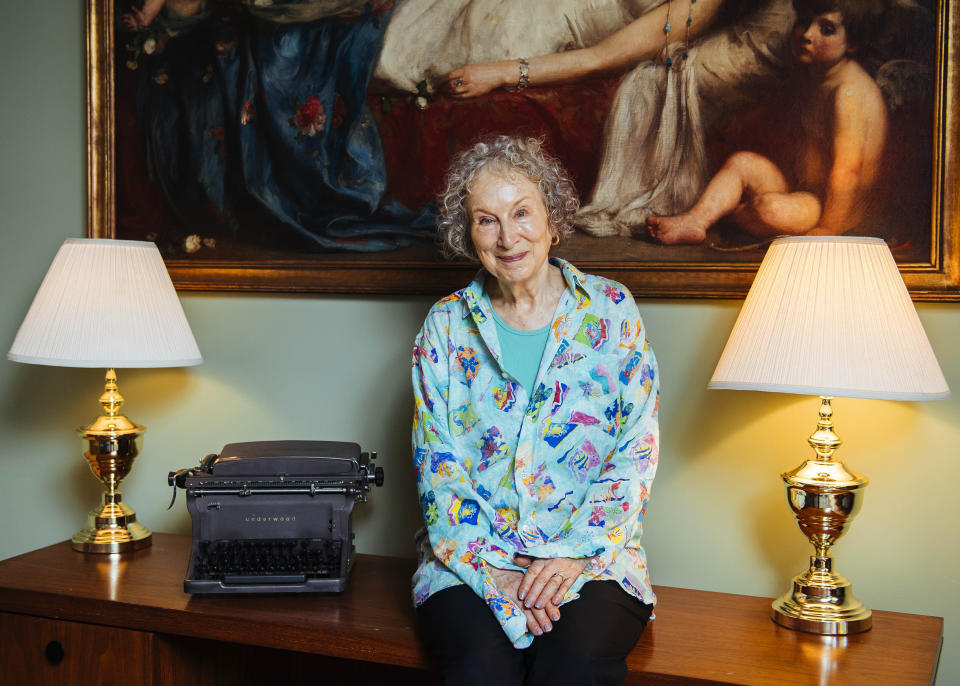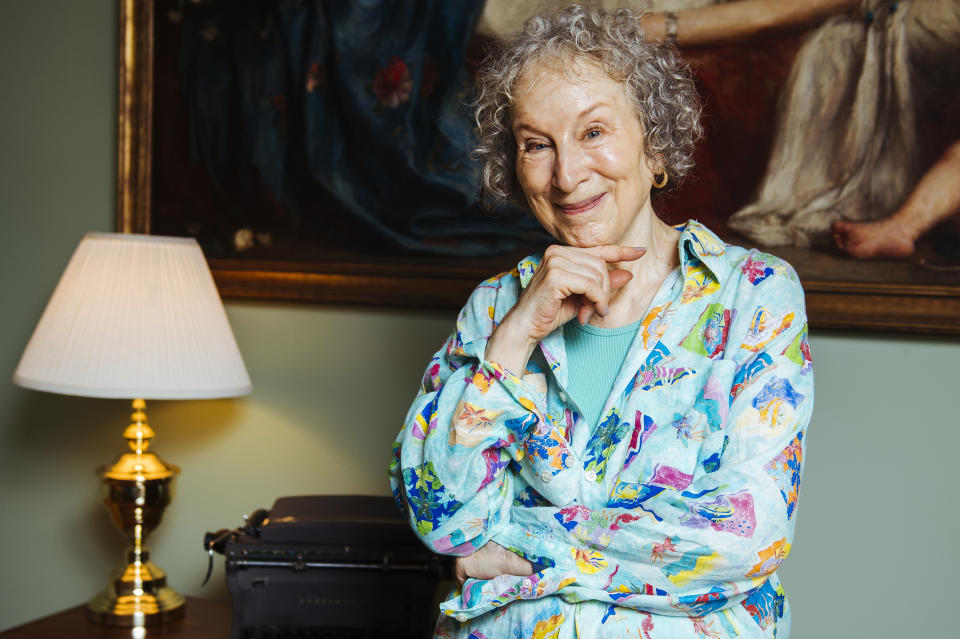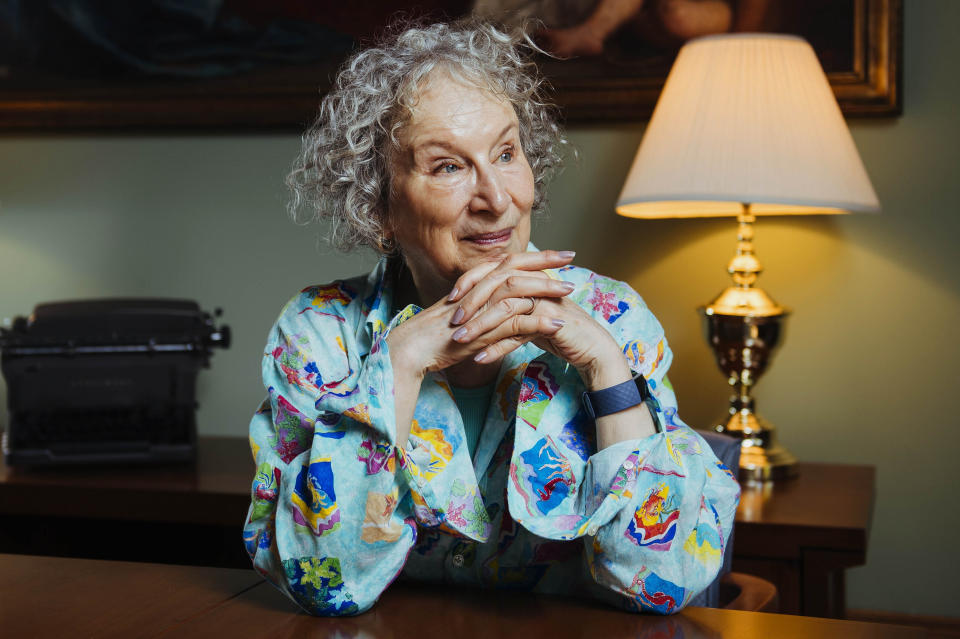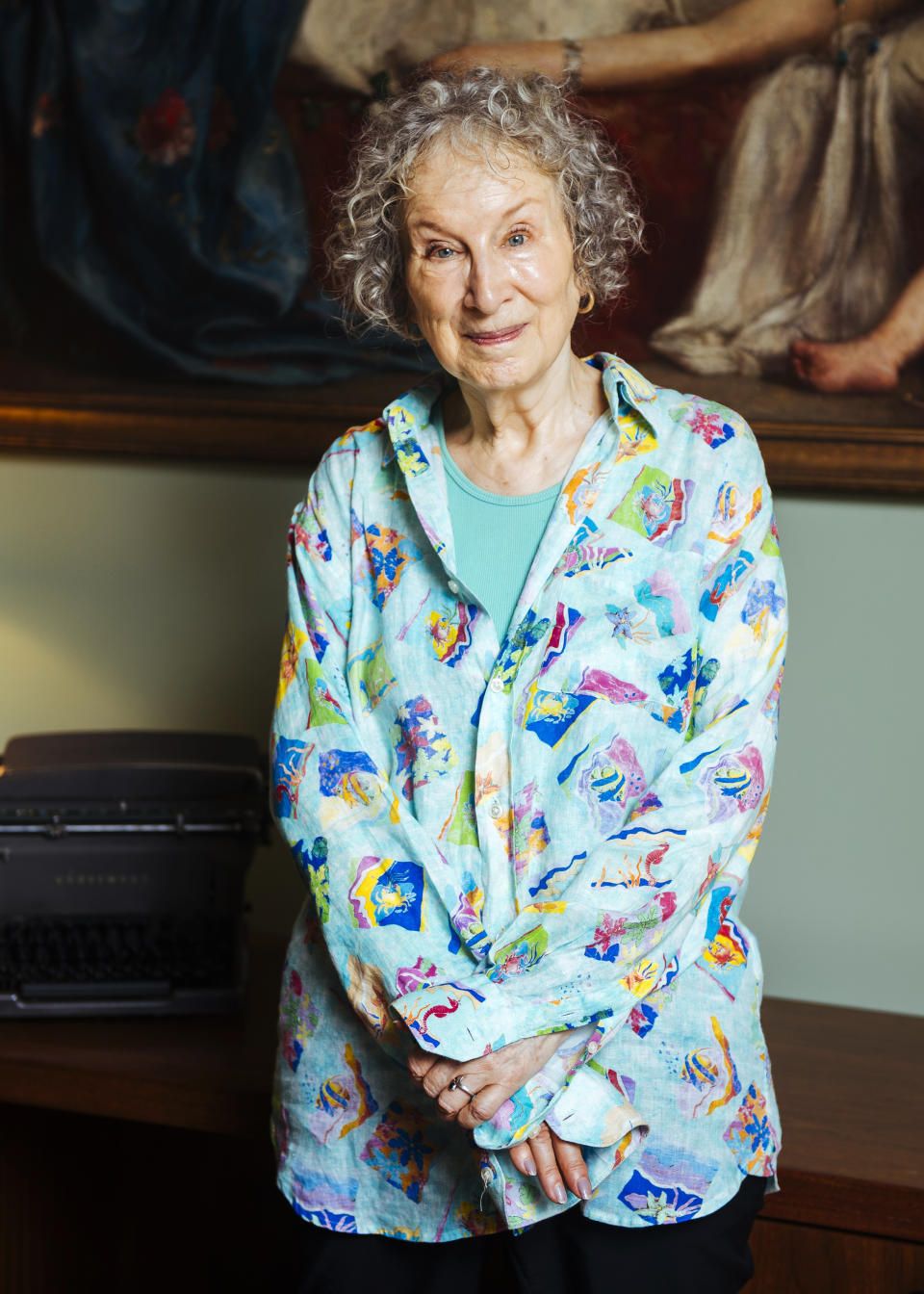Margaret Atwood returns us to Gilead in 'The Testaments'
TORONTO (AP) — From a park bench on the Victoria College campus, Margaret Atwood — class of 1961 — can trace her life of the mind.
"It was here that I decided to become a Victorian (literature student) at a time when it wasn't at all fashionable. They were considered gauche, kitsch, sentimental, absurd," she says, remembering the times she would dash back and forth across the park to take English classes on one side and history and philosophy on the other. "But the foundations of women's equality — John Stuart Mill, those kinds of thinkers — were Victorians and the position of women was a real hotbed topic, extending all the way from proper undergarments to higher education.
"One of my cherished facts is that women weren't allowed into classical art schools because they might see naked women," she adds with a laugh. "What a shock!"
Atwood is among the world's most celebrated authors and most famous Canadians, but on this humid afternoon she is undisturbed by passersby, beyond a few who momentarily turn their heads at the woman in the dark sun hat and blue buttoned shirt.
Just months shy of her 80th birthday, the longtime Toronto resident has otherwise never been more noticed. She has written the year's most anticipated novel, "The Testaments," the sequel to her classic "The Handmaid's Tale" and a Booker Prize finalist. Its contents were so guarded over the summer that early review copies were sent under a different title for fear of their being stolen.
In December, Atwood will be honored in New York by the Center for Fiction, which has given its first ever On Screen Award to her and to Hulu executives for the Emmy-winning adaptation of "The Handmaid's Tale." Hulu and MGM are now planning a series based on "The Testaments," which comes out Sept. 10.
Atwood is a literary writer who tries not to act like one, taking mock umbrage — "Of course. What do you take me for?" — when asked if she has read "The Hunger Games." She even apologizes for being "too erudite," although she can no more avoid being erudite than she can avoid speaking at all. Whatever the subject — Victorian literature, resistance movements, "Game of Thrones" — she is not only knowledgeable, but interesting — interesting and funny, interesting and incisive. Her voice, like her writing, is level and pointed, with the slightest inflection turning the mood toward irony, scandal or foreboding.
"There is a great wit along with the breaking of rules taking place" in her books, says fellow author and Canadian Michael Ondaatje. "And as an individual, she has been a remarkably brave spirit, supporting many causes to do with writers and politics."
She has written more than 40 books — novels, story collections, essays and poems — and her awards include the Booker Prize for "The Blind Assassin" and Canada's Giller Prize for "Alias Grace." She is a feminist heroine who in the introduction to a recent edition of "The Handmaid's Tale" defines a feminist novel not as idealizing women, but humanizing them, with "all the variety and character and behavior that implies." In her fiction, women are both killers and killed, betrayers and betrayed, rebels and oppressors.
"The Handmaid's Tale" was published in 1985 and is well settled alongside "1984," ''The Origins of Totalitarianism" and others in the canon of books warning us how bad bad can be. In the Republic of Gilead, formed in what was Cambridge, Massachusetts, in the wake of a radical coup, women are confined within a strict caste system that determines how they dress, how they are named (some for the men they serve) and with whom they may bear children. They are forbidden to vote, have jobs, or read or write.
Some are complicit, while other risks their lives resisting. The narrator, "Offred" ("of-Fred"), is ever torn between accommodation and defiance.
"I wish this story were different," Offred laments. "I wish it were more civilized. I wish it showed me in a better light, if not happier, then at least more active, less hesitant, less distracted by trivia."
"The Handmaid's Tale" reflects an imagination both expansive and grounded. As Atwood likes to point out, everything in the novel either has happened or could happen. Gilead, she says, is not "invented, but curated," so rooted in the actual and the possible that she speaks of reissuing the book with footnotes. For instance, the iconic handmaid uniforms of bright red cloaks and white bonnets that obscure their faces were inspired by the image on a container of Old Dutch Cleanser.
"Each detail I can tell you chapter and verse who did it when," Atwood says.
In announcing "The Testaments" last fall, she cited readers' curiosity about Gilead and, more darkly, "the world we've been living in." As she explains during her recent interview, she wrote "The Handmaid's Tale" in part as a response to the anti-feminist backlash of the 1980s. She didn't expect to write a sequel because she didn't expect the rise of Donald Trump and the world becoming more like the original novel. Even before he became president, she was resurrecting Gilead. In February 2017, just weeks after Trump's inauguration, she sent a memo to her literary representatives that outlined "The Testaments," how it would have three narrators and would be set around 15 years after Offred fled to an undetermined future.
"The Handmaid's Tale" anticipated much about the current moment, whether the "resistance" movement Mayday or Gilead's infamous Wall. In "The Testaments," the Wall remains, the resistance is stronger than ever and so are the denials; the official Gilead News service deems such reports "all fake."
Praised by The New York Times as a "compelling sequel," "The Testaments" was in the top 10 on Amazon.com a week before its publication, and will become a million seller if only a fraction of "Handmaid's Tale" readers buy it. "Handmaid's Tale" had been a steady seller for decades, but Trump's election and the Hulu series made it a phenomenon, with worldwide sales now exceeding 8 million copies.
Atwood has received letters from readers saying her book helped them cope with depression or make sense of living in religious communities. Naomi Alderman, whom Atwood mentored as Alderman wrote her acclaimed 2016 novel "The Power," says she was a teenager and an Orthodox Jew when she read "The Handmaid's Tale," which "pretty well rearranged" her brain. Woman activists around the world have worn the handmaid outfits, protesting in silence against everything from anti-abortion laws in Ireland to the general policies of Trump.
"Smart protest choice. They can't be thrown out for creating a disturbance, because they are silent," Atwood observes. "They can't be thrown out for dressing immodestly. But everyone seeing them knows what they signify."
Screen adaptations of acclaimed novels have a long and often unhappy history, but the Hulu project has been embraced by Atwood, audiences and critics. The series has received six Emmys, including one for lead actress Elisabeth Moss. Atwood is pleased "they have remained true to the central premise: Nothing goes in that does not have a real-life referent." Bruce Miller, the Hulu series' creator-showrunner and executive producer, says it was "very easy to glom on to her brilliant idea," and found it more creative to search for details in history and current events than "to sit around and invent atrocities."
The writing of "The Testaments" ran parallel to the making of the series, and was a process of subtle coordination. Atwood says she tried to avoid interfering or revealing any plot details beyond advising the makers: "Don't kill off this character. Don't kill off that character." Miller says there was "much give and take," and that Atwood would "give us a heads-up" if something might conflict with "The Testaments."
"She's in the unique position of understanding very well how to adapt her books to different art forms," says Miller, noting that "Handmaid's Tale" had previously been made into an opera and a feature film.
Atwood, born in 1939, is from the last generation of writers who lived her early years without television. The daughter of an entomologist (her father) and dietician (her mother), she spent much of the year in the North Woods of Canada, not only without TV, but without theaters, grocery stores, furnaces and flush toilets. Her imagination was formed by reading, whether comics, detective stories or "The Wizard of Oz." At Victoria College, part of the University of Toronto, she studied under the influential critic Northrup Frye, a most literary scholar who nonetheless appreciated a good detective story.
Atwood first gained attention as a poet, starting in the early 1960s with "Double Persephone" and reaching a national audience in 1966 with "The Circle Game." Her emphasis on poetry wasn't only artistic, she says — poetry was cheaper to publish than fiction, and Canadians writers in the 1960s were just beginning to establish themselves. Atwood, Nobel laureate Alice Munro and Robertson Davies were among those who helped Canadian literature become known worldwide, with Atwood's early contributions also including such novels as "Surfacing" and an influential work of criticism, "Survival."
"Atwood deserves recognition as a tireless and unselfish cultural ambassador," says Russell Brown, co-editor of the Oxford University Press' anthology of Canadian literature. "Atwood has done more to promote Canadian writing — both within Canada and beyond — than any other writer of her generation."
Her thoughts may run to the macabre and to disaster, but rarely to despair. Along with tyranny in Gilead, there is resistance, and confidence that hate is no more permanent than love. She has called herself a realist whose outlook is neither better nor worse than the world itself. But she also can't help believing that better is always possible.
Brown's co-editor of the Oxford anthology, Donna Bennett, says Atwood's thinking is characteristically Canadian. Atwood says it's characteristic of her profession.
"All writers are optimists," she says. "Why? Because it's a very optimistic thing to think one can actually write a book, and then to think that you can finish it, and then to think you can get it published, and then to think somebody may read it, and to think that some of them might like it.
"It's all very optimistic."





